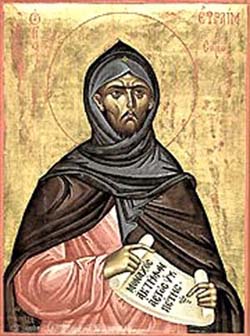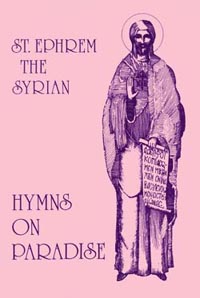 |
The Saint of the Day
St. Ephraem the Syrian – June 18
Prof. Plinio Corrêa de Oliveira
Biographical selection:
St. Ephraem (306-373) was born in Nisibis, Mesopotamia. He became a disciple of St. James, Bishop of Nisibis, and probably accompanied him to the Council of Nicea in 325. The deliverance of Nisibis from the Persians is attributed to his prayers. He retired to a cave near Edessa where he did most of his writing. He visited St. Basil at Caesarea in 370. Ephraem wrote many works on dogmatic and ascetical themes. He also strongly combated the Arians and Gnostics in numerous works.

St. Ephraem the Syrian
|
He was one of the greatest pioneers of Mariology and was known for his defense of the Immaculate Conception. As a missionary, he wanted to make the truths he taught as amenable as possible to the people. For this reason he composed poems and songs for them to sing. They were so pleasing that he became known as the Lyre of the Holy Spirit. He was proclaimed a Doctor of the Church in 1920.
Comments of Prof. Plinio:
I cannot imagine anything more beautiful and appealing than St. Ephraem with his characteristic Eastern features seated on a stone in a rolling valley framed by a large tree and small fountain. I picture him in that position recollected and composing a beautiful song about Our Lady to be sung with those simple, rural lyrics that characterize the music of the East. As he composes the poem, he simultaneously develops theology about Our Lady.
In those cities and villages of 4th century Mesopotamia, adults and children learned Catholic doctrine by means of the songs of St. Ephraem. They would sing his songs during their work in the fields at day, with their family at night, during their celebrations and feasts, and so on. St. Ephraem had the genial good spirit to inaugurate this type of apostolate that answered the legitimate need of the people for songs to glorify Our Lady.

The hymns of St. Ephraem are still being compiled today
|
The name he earned, the Lyre of the Holy Spirit, also reflects a part of his soul. You can imagine a lyre sitting on a table that starts to play without anyone touching it. It is the Holy Ghost who plays on it. This scene reflects a trait of the soul of St. Ephraem. The Holy Ghost inspired St. Ephraem to write the songs in honor of Our Lady as if He were playing a lyre.
The apostolate of song that St. Ephraem made reminds me of how songs were often made in the past to accompany major episodes in Catholic life. For instance, the epopee of the Crusades had many songs Catholic knights would sing either en marche to battle or in the battle itself that prepared them to die for Our Lord Jesus Christ. It is beautiful to consider the warrior prepared to give his life for Christ. It is the beauty of heroism, the beauty of the war for Our Lord. Contemplating this, we admire those who are ready to pay God the tribute of their lives. Even if his death achieves no practical goal, the Catholic knight offers it for the sole reason of paying a perfect tribute to God. God created that Catholic knight, and he offers himself to God as a precious perfume that emits from its bottle in order to glorify Him. It is the beauty of the holocaust.
The Holy Ghost who inspired St. Ephraem to compose songs in order to teach people good Catholic doctrine will perhaps also inspire other composers to write songs to prepare Catholics to fight and act for the glory of God and Our Lady in the great events predicted by Her at Fatima.
Let us pray to St. Ephraem on his feast day and ask him to give us an understanding of the Catholic Church in all her beauty and poetry, so that even if we are not able to compose songs and hymns for the glory of God and Our Lady as he did, we can admire them and elevate our souls.


  | | Prof. Plinio Corrêa de Oliveira | |
The Saint of the Day features highlights from the lives of saints based on comments made by the late Prof. Plinio Corrêa de Oliveira. Following the example of St. John Bosco who used to make similar talks for the boys of his College, each evening it was Prof. Plinio’s custom to make a short commentary on the lives of the next day’s saint in a meeting for youth in order to encourage them in the practice of virtue and love for the Catholic Church. TIA thought that its readers could profit from these valuable commentaries.
The texts of both the biographical data and the comments come from personal notes taken by Atila S. Guimarães from 1964 to 1995. Given the fact that the source is a personal notebook, it is possible that at times the biographic notes transcribed here will not rigorously follow the original text read by Prof. Plinio. The commentaries have also been adapted and translated for TIA’s site.
|
Saint of the Day | Home | Books | CDs | Search | Contact Us | Donate

© 2002- Tradition in Action, Inc. All Rights Reserved
|
 |

|